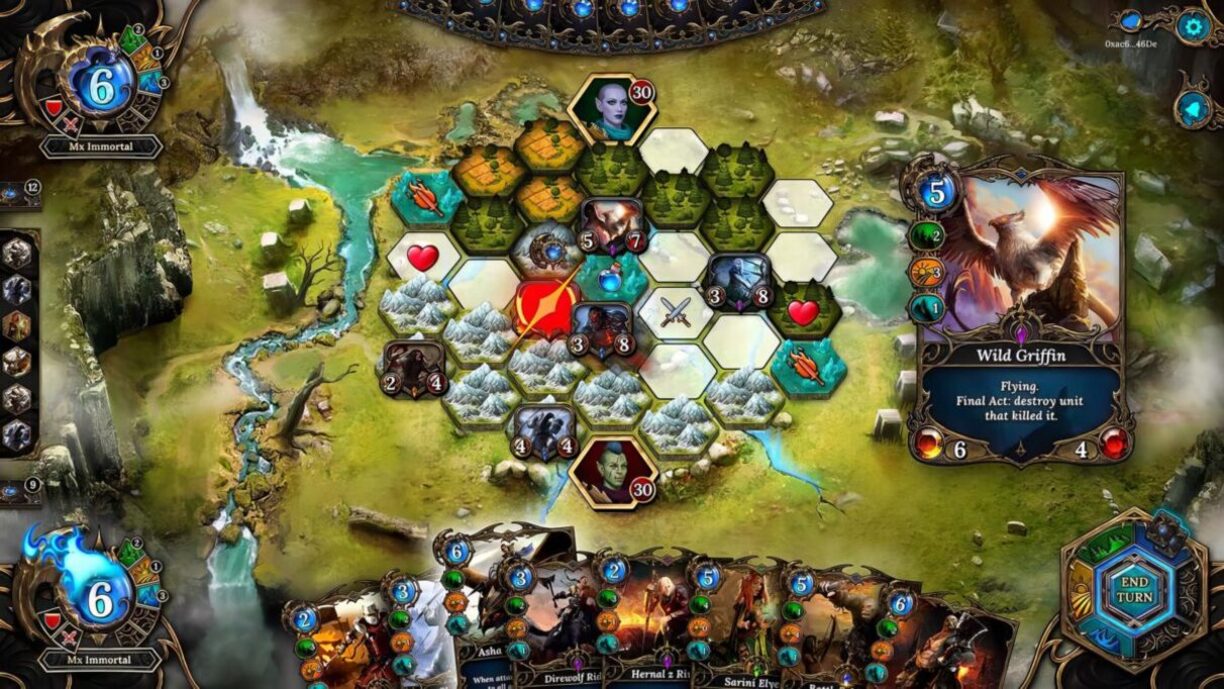Legends of Elysium in Game Boards is a captivating topic that offers a deep dive into the innovative gameplay of Legends of Elysium, or “LoE” for short. This free-to-play, platform-independent online card game affords players genuine ownership over their in-game assets. With one-of-a-kind races and a compelling narrative, LoE marries the traditional strategic elements of card games with aspects of board games in a fresh and absorbing manner.
Our exploration begins with the ‘Boards’, the charming term used for the game’s battlegrounds. Here, conflicts unfold between opponents situated opposite each other on hexagonally-shaped grid fields. This element introduces an extra strategic layer that sets it apart from conventional card games. Each Board boasts unique features, providing a varied landscape that continues to evolve as the game develops.
The main goal in combat is to surpass your adversary. Throughout the game, each turn lets players draw a random card from their deck and transform the adjoining land or unit hex into their preferred kind of Land. This rule stipulates that unit cards can only be placed on lands you’ve constructed, barring card-specific exceptions. Similarly, when deploying units, they can only move through yours or your opponent’s unoccupied hexes, advancing one hex at a time. Combat between units ensues only if they’re adjacent unless a unit’s special ability indicates differently.
Why are these Boards advantageous to players, you inquire? Beyond their distinctive aesthetic and layout, they contain various mines and special fields. Despite differences, all Boards share the common feature of a hexagonal grid arrangement. One notable point about these Boards is the ease with which they’re updated via simple database adjustments, contributing to the dynamic nature of the game.
Potential modifications include deactivating certain hexes, endowing specific hexes with unique properties, or dictating initial hero placements. Boards can be embellished with special abilities and fields that grant beneficial effects to the player in control at the turn’s start. Benefits from these fields could include additional mana, healing of units, bonus cards per turn, inflicting damage on an opposing unit, reducing the cost of a card, boosting a unit’s attack, or even augmenting a unit’s maximum health.
Moreover, Boards offer one-time bonuses. When a unit enters such a field, the player receives the corresponding advantage. These one-off perks might entail mana boosts, raising a unit’s health, acquiring an extra card, enhancing a unit’s attack, or decreasing a card’s mana cost in the player’s hand.
An innovative aspect of the game is the introduction of Mines, unique to the Boards, granting players various passive bonuses. Each Board can support up to three mines, with different bonuses based on the Board type. To activate mines, players must link their tokens to their chosen mines, with the bonus magnitude dependent on the token-mine linkage quantity. Nonetheless, there’s a cap on the number of tokens that can be bound to each mine per player.
LoE also acknowledges its devoted players, the so-called Board Validators, who receive temporary premium accounts. These individuals are essentially the Board proprietors and, correspondingly, can garner additional benefits such as automatic whitelist positions for all transactions, extra daily Elytronite, daily LoE tokens from a specific section of the game’s treasury, and various other in-game advantages.
It’s also crucial to note that the rewards attributed to each board are contingent on its level. Any new board begins at level 2, with existing boards’ levels decreasing by one every time a new board is released. This pattern continues until the boards hit a minimum level of zero, at which point they cease to bestow rewards upon the owners.
For illustration, consider this scenario: there’s a pre-existing game board named Genesis Board at level 2, which entitles owners to portions of daily rewards. After three months, a new board, the Deathland Board, surfaces. The emergence of the Deathland Board reduces the level of Genesis Board to level 1, while the newcomer starts at level 2. Should a player possess both the Genesis and Deathland Boards, they will experience the benefits of both Boards’ rewards separately.
Legends of Elysium presents a multidimensional system that weaves together card play and board game mechanics, luring fans of strategy games and forward-thinking players alike. The board landscapes are as fluid as the game’s possibilities, offering each player a dynamic and challenging experience!
